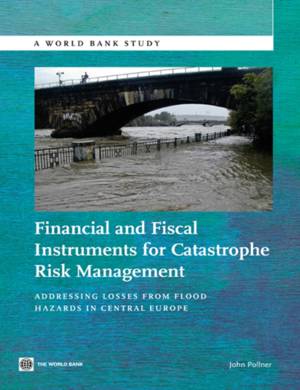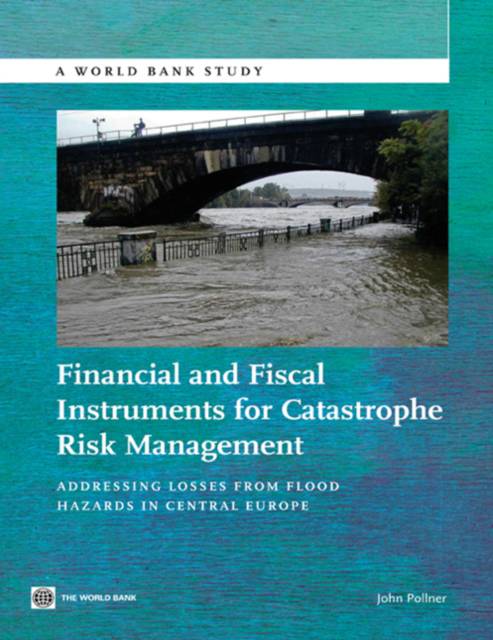
- Afhalen na 1 uur in een winkel met voorraad
- Gratis thuislevering in België vanaf € 30
- Ruim aanbod met 7 miljoen producten
- Afhalen na 1 uur in een winkel met voorraad
- Gratis thuislevering in België vanaf € 30
- Ruim aanbod met 7 miljoen producten
Zoeken
Financial and Fiscal Instruments for Catastrophe Risk Management
Addressing the Losses from Flood Hazards in Central Europe
John Pollner
€ 44,45
+ 88 punten
Omschrijving
This applied study addresses the large flood exposures of Central Europe and proposes efficient financial and risk transfer mechanisms to mitigate fiscal losses from such natural catastrophes. In 2010 the V-4 Visegrad countries (i.e., Poland, Czech Republic, Hungary and Slovakia) demonstrated their historical vulnerability to floods - Poland suffered $3.2 billion in flood related losses, comparable to it $3.5 billion of losses in 1997. Flood modeling analysis of the V-4 shows that a disaster event with a 5 percent probability in any given year can lead to economic losses in these countries of between 0.6 percent to 1.9 percent of GDP, as well as between 2.2 percent to 10.7 percent of government revenues. Larger events could quadruple such losses. The European Union Solidarity Fund is available as a mechanism for disasters but it comes into effect at only very high levels of losses, does not provide sufficient funding, and is not speedy. An insurance-like mechanism for National Governments can be tailored for country-portfolio needs for buildings, properties and critical infrastructure. By virtue of the broad territorial scope, fiscal support should use mechanisms that provide payments triggered by physical flood measurements in selected areas (rather than site-by-site losses as in the traditional insurance industry). A multi-country mechanism for insurance pooling of risks to protect infrastructure can also provide major cost efficiencies for all governments, using parametric-or index contracts. Savings from pooling can range from 25 to 33 percent of the financing costs that each country would otherwise have paid on its own. There are several instruments and options for both insurance, and debt financed mechanisms for funding catastrophes. All instruments can be analyzed based on equivalencies in terms of market spreads. A hybrid-like instrument, the catastrophe bond, is really a risk transfer instrument but structured as a debt security. The V-4 countries should therefore begin to set up the financial mechanisms to prevent major fiscal losses from future catastrophic floods and avoid fiscal disruptions when these occur. The instruments proposed can be market tested and supplemented with exacting studies on hydrology and topography used to fine tune the loss estimations per event and where property and infrastructure are exposed.
Specificaties
Betrokkenen
- Auteur(s):
- Uitgeverij:
Inhoud
- Aantal bladzijden:
- 216
- Taal:
- Engels
- Reeks:
Eigenschappen
- Productcode (EAN):
- 9780821395790
- Verschijningsdatum:
- 23/07/2012
- Uitvoering:
- Paperback
- Bestandsformaat:
- Trade paperback (VS)
- Afmetingen:
- 178 mm x 254 mm
- Gewicht:
- 385 g

Alleen bij Standaard Boekhandel
+ 88 punten op je klantenkaart van Standaard Boekhandel
Beoordelingen
We publiceren alleen reviews die voldoen aan de voorwaarden voor reviews. Bekijk onze voorwaarden voor reviews.













